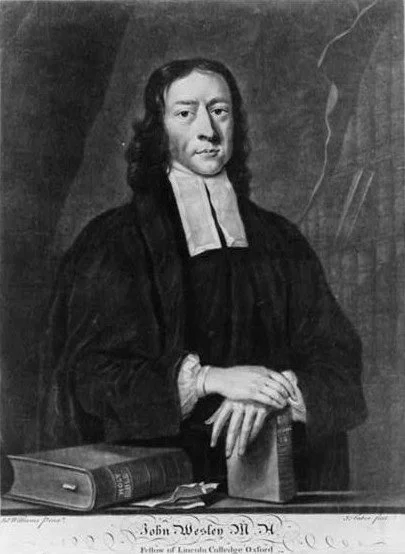Not Perfect JUST Forgiven?
A bumper sticker reads: "Christians aren't perfect, just forgiven!" The implication of the bumper sticker seems to be that the only purpose of Christ’s work on earth was atonement. If that is the implication, the ever-pastoral, John Wesley, might commend them on the start of their Christian journey, encouraging them to continue realizing and embodying their forgiveness, into Christian perfection. Wesley might emphasize the “just” portion of the sticker, exclaiming, “But Christians aren’t just forgiven, they're so much more!” Christians are enabled by the Spirit to grow more like Christ. John Wesley’s Trinitarian theology informs a response that Christians are not “just forgiven,” they’re empowered through Christ’s grace, and the ever-present works of the Spirit to re-image themselves into the imago Dei. A re-imaging that offers glimpses of God’s plan for all of humanity.
Wesley affirms atonement is essential to God’s purposes for humanity, the missio Dei. In the fall of man, through Adam, did sin and death enter the world, as well as “pain, sickness, and a whole train of uneasy as well as unholy passions and tempers.”1 Wesley highlights the ways that God has used, even humanity’s worst mistakes, for good : “By the fall of Adam mankind in general have gained a capacity, first of being more holy and happy on earth; and secondly, of being more happy in heaven, than otherwise they could have been.”For Wesley, God’s plan for humanity, through Christ, was never just forgiveness. Christ’s mission was to reverse an endless cycle of suffering and separation of humanity from God. Christ offered not just forgiveness but also the possibility of holiness. Holiness leads to not just atonement but an invitation to participate in the missio Dei, God’s mission on earth.
One may offer a contextual translation to Wesley, “the bumper sticker means “Christians aren’t perfect, just saved.” Wesley would perhaps respond “[But] salvation [is] both instantaneous and gradual. It begins the moment we are justified, in the … love of God and man. It gradually increases from that moment.” Wesley’s reappropriated response points to the necessity of not just being saved, or justified, but the necessity of accepting salvation in Christ’s grace such that there is an embodied response. “God worketh in you, therefore you must work… together with [God].” A full adoption of Christ’s grace in salvation or justification, that the very inward motivations of Christians are changed. The inward changes, enact change on the outward actions of Christians. Christians are not invited into ever being saved, in the past tense, but an ever-working justifying of a whole Christian. Justifying that continually works to form a Christian into the creation that God intended them to be, the imago Dei.
The work of the Christian is not just to be saved but to incorporate their salvation into their daily actions. Wesley delineates between just being nice, doing good, and Christian embodiment. He encourages not just being a good person, but through Christ adding piety to justice, justice in a way that serves others and not self. Wesley presses hard work, but in all actions, intermixing heartfelt prayer.5 Wesley’s model of Christian perfection, is one of tangential growth. As a Christian grows closer to God, accepting more of God’s grace, the Christian’s capacity for grace increases, necessitating ever more acceptance. “[Christian Perfection] is only another term for holiness.” The more holiness Christians adopt through Christ’s grace, the higher their capacity for holiness. “Jesus saves his people from their sins: and not only their outward sins, but also … from evil thoughts and evil tempers.” The freedom from inward motivations to commit sin, as enabled by Christ’s grace, is what salvation is to John Wesley. In order to be saved, forgiveness is only the beginning, Christian perfection, a tangential movement to Christ’s holiness, is salvation.
Inseparable from Wesley’s soteriology is Wesleyan Trinitarian theology. Wesley did not insist on defining Trinitarian doctrinal specifics but instead, infused the ongoing works of creation and redemption enabled by the presence of the Triune into every aspect of Christian life. It is the Spirit that enables the continuing redemptive work performed in Christ’s passion, work begun by God with the Israelites in the covenant. The ongoing work of the members of the Triune in the lives of humanity is a testament to the relationship within the members of the Triune and to the unity in their comprehensive across history. The works of the Triune is what enable grace to be available and accepted. The harmony and co-creative actions within the relationships of the Triune is also the model for God’s invitation to humanity to co-realize the reign of God.
The Trinity’s work in Wesley’s soteriology is synthesized in Wesley’s theology of sacraments. Sacraments are a means of accepting God’s grace through a tangible symbol, a remembrance that transcends into re-enactment. Grace that is made as available as during every redemptive action of God in Christ and carried into the present by the Spirit. The incorporation of sacraments into Christian life contributes power to transforming believers and restoring them into the image of God. Sacraments are to enable Christian perfection. Thus, the purpose and mission of sacraments is to facilitate the re-imaging of each believer.
A bumper sticker is a witness, it projects meanings and implies contexts reaching far beyond a car’s bumper. This bumper sticker speaks to entire theologies about the mission of Christ, salvation, evangelism, and the mission of the church. John Wesley had volumes to say about any one of these topics. Similarly, as Wesley may emphasize the just in “just forgiven,” he would not leave the purpose of Christian perfection just to individual salvation. Wesley’s missional theology and eschatology are the result and purpose of Christian perfection.
Just as the purpose and mission of the sacraments is to facilitate the re-imaging of each believer, Wesley’s Triune theology infuses the call and purpose of the church. The church is the community that catalyzes individuals to salvation and Christian perfection through functioning as a conduit for Christian community and a playground for the means of grace. The church is to act as a facilitator and encourager of re-imaging individual believers, then the world. The church universal is called to be the body of Christ and witness to the presence of Christ. The outward and inward changes of believers, through God’s grace, collectively re-image all of creation and society closer to the intentions of Creator God. The mission and purpose of the church point to the humanly impossible task of bringing about the rule of God, all the while recognizing a realized future possibility only through God’s providence.9
It is the very striving for Christian perfection in which Christians embody an eschatology already realized, the experience of God’s plan revealed in Christ. The Good News that Christ has died, Christ is risen, and that Christ will come again is tangible and re-enacted in the actions of the church. A church that is to work at facilitating tangential, ever closer, growth to Christian perfection in individuals and spreading to all of humanity. John Wesley’s response to "Christians aren't perfect, just forgiven!" might be “But Christians aren’t just anything!” Wesley might point to the enabling power of the Spirit in redemption, salvation, and growth in Christian perfection. Wesley might remove a sharpie from his pocket and expand the witness to Christ’s immense grace on the bumper sticker to
Works Cited
Fetters, Rachel. “SACRED ACCESSIBILITY Forming a Personal Sacramental Theology.” Unpublished Academic Paper. Saint Paul School of Theology, September 28, 2023.
Knight, Henry H. Anticipating Heaven below: Optimism of Grace from Wesley to the Pentecostals. Eugene, Oregon: Cascade Books, 2014.
Maddox, Randy L. Responsible Grace: John Wesley’s Practical Theology. Nashville, Tenn: Kingswood Books, 1994.
———. “Wesley’s Prescription for Making Disciples of Jesus Christ: Insights for the 21st Century Church.” Duke Divinity, n.d. https://divinity.duke.edu/sites/divinity.duke.edu/files/documents/faculty-maddox/22_Wesleys_Prescription_Duke.pdf.
Wesley, John. “Christian Perfection.” In John Wesley’s Sermons: An Anthology, edited by Albert C. Outler and Richard P. Heitzenrater. Nashville: Abingdon Press, 1991.
———. “God’s Love to Fallen Man - Sermon 59.” In John Wesley’s Sermons: An Anthology, edited by Albert C. Outler and Richard P. Heitzenrater. Nashville: Abingdon Press, 1991.
———. “On Working Out Our Own Salvation.” In John Wesley’s Sermons: An Anthology, edited by Albert C. Outler and Richard P. Heitzenrater. Nashville: Abingdon Press, 1991.
———. “The More Excellent Way.” In John Wesley’s Sermons: An Anthology, edited by Albert C. Outler and Richard P. Heitzenrater. Nashville: Abingdon Press, 1991.



